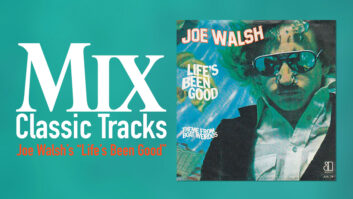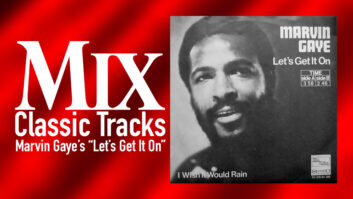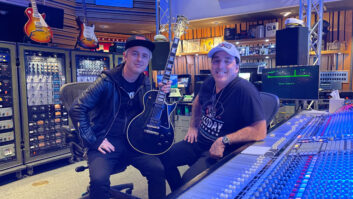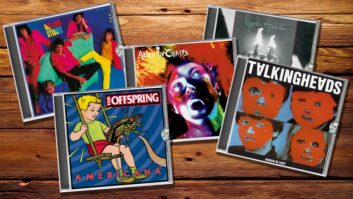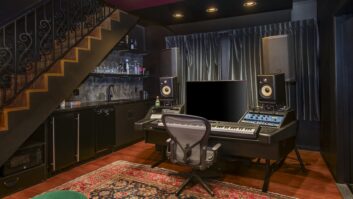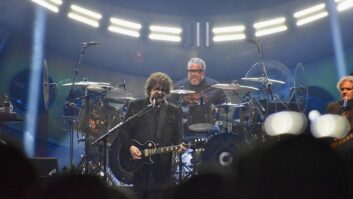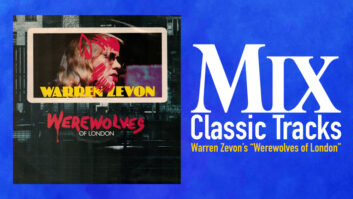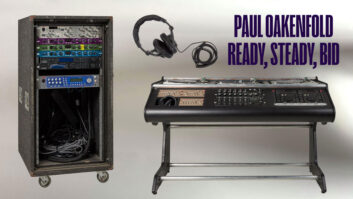
Philadelphia, PA—“Over 25 years, you don’t just have something that puts you on the map,” says producer and engineer Tommy Joyner, co-owner, with composer Jamie Lokoff, of Philadelphia’s MilkBoy the Studio. “It’s more like a slow growth—or slowly existing and not dying, depending on the year.”
Happily, MilkBoy is doing much better than simply existing. “The past three years have been the best we’ve ever had,” Joyner reports.
Philadelphia is currently a hot music scene, he says. “A lot of record labels are signing Philadelphia artists, and they’re charting. For as much as you can do at home, people still want that big studio thing, that vibe, and there aren’t many left—so against all odds, the studio’s been doing pretty good.”
Recent clients have included Philly rockers Low Cut Connie, Grammy and Dove Award nominee DJ Camper and Lil Uzi Vert, whose “Futsal Shuffle” debuted at number 5 on the Billboard Hot 100 in December 2019. “He’d been here for years working,” says Joyner, “so I was glad that something good happened.”

Joyner founded MilkBoy in 1994 in one of Philadelphia’s inner-city neighborhoods. “People would ask, ‘Is my car okay out there?’ The answer then was, ‘No, but we’ll do our best to keep an eye on it!’”
He partnered with Lokoff in 1999. A few years later, the pair moved MilkBoy Recording to Ardmore, in the Philadelphia suburbs. A variety of artists came through the location, including Dave Matthews, the Dixie Hummingbirds and UK band Gomez, with producer Steve Berlin.
It was while in Ardmore that Joyner and Lokoff began to diversify the MilkBoy brand, opening a 100-person-capacity coffee shop and music venue, since closed. A coffee shop is a tough business, says Joyner, “but people gave us a lot of credit and thought we were doing something interesting.”
MilkBoy as both an entertainment and hospitality brand began to kick into high gear with a move downtown in 2011. Having weathered the Great Recession in the suburbs, Joyner and Lokoff got a liquor license and opened up a 200-person-capacity venue in Center City. “There’s a bar and restaurant on the first floor and a venue on the second floor. We got lucky; we opened a popular bar in a big city,” says Joyner.

Studio Showcase: Tweed Recording Audio Production Academy, by Steve Harvey, Jan. 8, 2020
MilkBoy also acquired and relocated to a 20,000-square-foot production facility owned by composer Larry Gold, once a member of legendary Sigma Sound Studios house band MFSB and hip-hop’s go-to string arranger. “It was called the Studio, so we changed our name from MilkBoy Recording to MilkBoy the Studio to retain a piece of the name,” says Joyner.
The complex features a George Augspurger-designed main room with his soffited main monitors and a 1,200-square-foot live room with a 14-foot ceiling and two iso rooms. Two smaller overdub and edit rooms are outfitted with Pro Tools and a variety of outboard gear.
Studio A was already outfitted with an SSL 4048E/G desk and a Studer A827 tape machine. The pair sold their Neve console and took Joyner’s collection of drums and guitars and Lokoff’s assortment of keyboards, plus the contents of their vintage mic locker, to the new location. “Larry’s outboard and mic collection also stayed, so we melded everything together and the gear list got pretty sweet.”
The facility also came with gold and platinum records on the walls from Gold’s work with the likes of Kanye West, Justin Timberlake and John Legend. MilkBoy had been building its resume, too. “Before we left Ardmore, we worked on Usher’s Raymond v. Raymond,” says Joyner. “We got a really nice credit on a gold record and a Grammy nomination for that.”
George Augspurger On the Move, by Steve Harvey, March 26, 2019

But it was an earlier gig as a sideman, playing drums on a Digable Planets reunion tour, that Joyner credits more than anything with first putting MilkBoy on the map. “It didn’t last long, maybe 10 weeks. It was a reunion that toured but never really got off the ground, but it’s on my resume and I’m very proud of it.”
At the new location, he says, “One of the first big clients was probably Miley Cyrus. The Bangerz album was the first platinum record that we hung up from work that we did here.” The following year, Joyner worked on Before This World, James Taylor’s first album to ever hit the top slot on the Billboard 200 chart.
The move downtown wasn’t only good for MilkBoy’s record production business. “Suddenly we were doing a lot more ad work, composition and mixing to picture, for advertising agencies,” he says. “We could never really get that when we were in the suburbs.”
Capitalizing on that business, a couple of years ago, he says, “We partnered with Mark Schultz in a new brand, Shake Audio Post, and built a new audio post room that we call Studio G, with a 7.1 surround system. Mark does incredible work there.”

The recent bump in business has allowed MilkBoy to keep up with technology. “We’ve had a couple of good years, so we’ve upgraded our Pro Tools rigs and done some further room tuning. I added some subs into Studio A because of the demand from the hip-hop sessions. We were blowing TAD monitors left, right and center, so now the pressure has been taken off the dual-15s in the Augspurger monitors.”
In 2016, MilkBoy opened a second bar—60-person capacity—on Philadelphia’s touristy South Street. “We run an open mic there that’s been a lot of fun,” says Joyner.
Continuing the MilkBoy coffee shop legacy, the two bars foster talent in the local community. “Each week, we pick a standout performer, and at the end of the month, we put them on a showcase at the larger venue. We’ll pick a standout performer from that, and at the end of the quarter, we’ll have a showcase, then a yearly showcase.” Last year, the overall winner was awarded a record deal and a publishing contract.

“We’re doing the same thing this year. It’s very energizing for the music community,” says Joyner.
The two venues and the studio work harmoniously, Joyner reports. “We’ve created our own little ecosystem. It’s really unique; I’ve never seen it done any other place, having three disparate businesses feeding each other. We feel really lucky.”
MilkBoy the Studio • www.milkboythestudio.com
